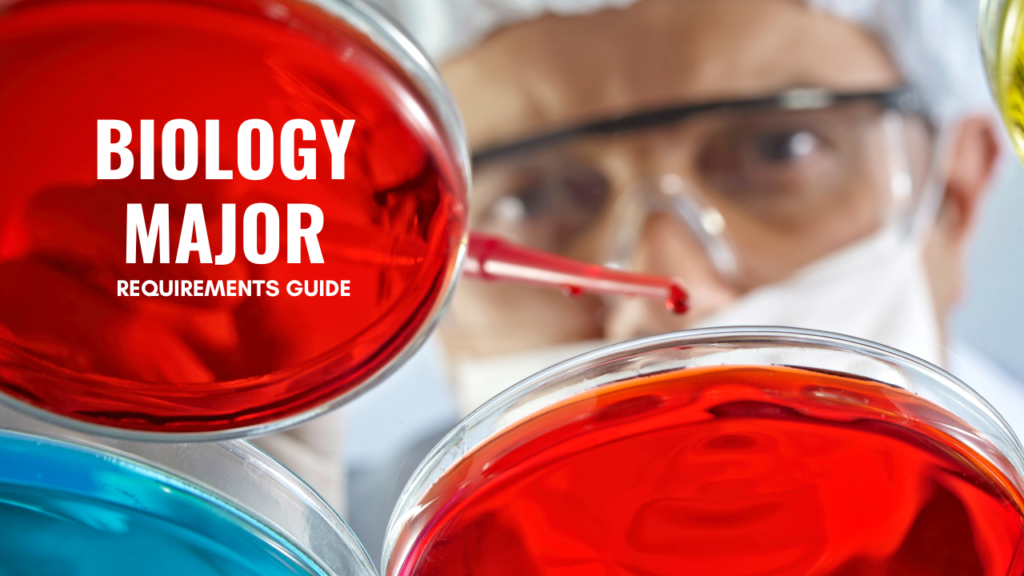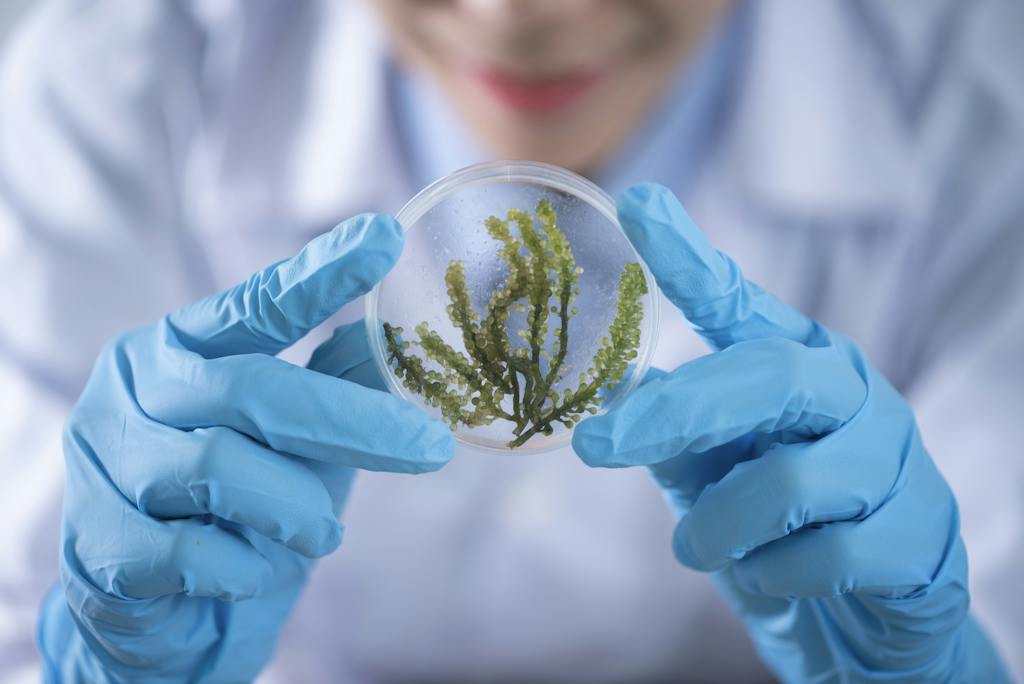Biology Major Requirements Uncovered
A biology degree provides students with a broad foundation in the natural sciences and an understanding of living organisms. It opens up diverse career paths in healthcare, research, education, environmental science, biotechnology, and more. However, biology major requirements are no joke!
With a biology degree, you’ll gain a solid base to specialize further through graduate studies or additional certifications. Or you can secure entry-level positions related to biology and build up your skills from there. The critical thinking, analysis, research, and communication skills developed as a biology major are valued across many industries.
Typical Prerequisite Courses

Before officially declaring a biology major, students need to complete foundational courses in related sciences and math. Typical prerequisites include:
- General Chemistry – At least 2 semesters of inorganic chemistry are required. This provides a basic understanding of elements, atomic structure, bonds, chemical equations, reactions, etc.
- Organic Chemistry – 2 semesters of organic chemistry built on general chemistry principles but focused specifically on carbon compounds. Critical for understanding biomolecules in living things.
- Physics – 2 semesters of introductory physics cover mechanics, motion, energy, electromagnetism, thermodynamics, and more. This is important for understanding the principles of movement, vision, and electricity in living systems.
- Calculus – At least 1 semester of calculus focuses on rates of change, derivatives, integrals, and quantitative analysis. This aids in modeling and data analysis.
- Cell Biology – An introductory cell biology course covers cell anatomy, metabolism, signaling pathways, division, gene expression, and more. This is the basic functional unit of life.
- Statistics – 1 semester of statistics trains students in variability analysis, distributions, statistical testing, and recognizing significant patterns. It is important for designing experiments and interpreting results.
Biology Major Requirements: Core Curriculum
One of the great aspects of a biology degree is the range of subfield focuses and specializations available. This allows students to align the degree with particular interests and career goals. Here are some of the possible specializations:
- Cell and molecular biology – Studying cell structure, function, and regulation at the molecular level. People in this field examine processes like gene expression and protein synthesis.
- Genetics and genomics – Analyzing genetics, DNA sequencing, genetic engineering, and more. This field is rapidly expanding with innovations in gene editing and the growth of personalized medicine.
- Microbiology – Learning about microorganisms like bacteria, viruses, fungi and parasites. Microbiologists study diseases, develop antibiotics, and leverage microbes for commercial uses.
- Immunology – Investigating the immune system and its role in keeping organisms healthy. Key applications include developing vaccines and treating immunodeficiency conditions.
- Neuroscience – Studying the nervous system and brain. Neuroscientists examine brain cells, cognition, neurological disorders, and potential treatments.
- Marine biology – Exploring aquatic ecosystems and ocean life. Possible creatures to study include fish, coral, mammals like dolphins, and microscopic organisms.
- Ecology and evolutionary biology – Looking at populations, environments, adaptation, and the evolution of species over time. These scientists study biodiversity, extinction, and the impacts of things like climate change.
While you’re here, you may also want to watch this video about the biology degree that I made:
Concentration/Specialization Options
Many biology programs allow students to concentrate their studies in a particular subfield or specialization. This enables tailoring the degree towards desired careers or research interests in graduate school. Here are some common concentration options:
Microbiology
Students take courses specific to the morphology, physiology, genetics, and ecology of microbes. Core topics include virology, bacteriology, immunology, and pathogenesis. Labs build skills in aseptic techniques, culturing microbes, and identifying pathogens.
Biotechnology
Courses emphasize molecular biology techniques like gene cloning, CRISPR, protein engineering, and genome editing. Applications range from drug development to agricultural advancements.
Botany
Plant-focused coursework covers structure, growth and development, physiology, taxonomy, evolution, and ecology of plants. Labs examine plant populations and may incorporate fieldwork.
Zoology
Courses examine animal physiology, behavior, classification, evolution, and ecology. Students may take specific courses on invertebrate or vertebrate zoology. Labs often involve animal observations, dissections, and field studies.
Physiology
Human and comparative physiology courses take a systems-based approach, examining cell, tissue, and organ functions. Topics may include circulatory, digestive, muscular, neural, reproductive, and endocrine physiology.
Neuroscience
Classes cover brain anatomy and physiology, neural signaling, sensation/perception, cognition, and brain disorders. Labs incorporate brain imaging and recordings.
These are some examples of possible concentration areas, but many other specialty subjects exist within the biology realm. Course and lab work prepare students for associated careers or graduate study.
Biology Major Requirements
In addition to the core biology curriculum, students need to complete requirements in related disciplines:
- Math and Statistics – Calculus 1 and statistics are typical prerequisites. Additional math and stats courses build quantitative and computational skills for modeling biological systems, designing experiments, and analyzing results.
- Biochemistry – One or two semesters of biochemistry connect biological concepts to underlying chemical structures and processes. This is important for fields like molecular biology, physiology, genetics, and medicine.
- Laboratory Research Skills – Hands-on lab courses teach vital skills like pipetting, antibody staining, microscopy, chromatography, electrophoresis, animal handling, and proper documentation. This prepares students for research.
- Bioethics – Due to advances in genetics and biotechnology, courses in ethics are often required. These explore the responsible use of science and medicine in areas like gene editing, artificial organs, cloning, etc.
- Technical Writing – Practice in scientific writing is key for developing lab reports, research papers, and professional scientific documents. Formatting, clear language, and data presentation are emphasized.
Building competency in these related disciplines ensures biology graduates have a cross-disciplinary toolkit for success in biological science careers.

Flexible Electives
One of the advantages of a biology degree is the flexibility to complement required courses with electives tailored to your academic and career interests. Here are some potential options:
Psychology
An intro psych course provides a solid base of the brain science behind behaviors and mental processes. Additional psych electives can target child development, disorders, personality, etc. This aids biology students interested in neuroscience or medicine.
Public Health
Introductory epidemiology and public health courses cover disease outbreaks, prevention, health policy, social determinants of health, and more. This helps those aiming for medical or research careers.
Computer Science
Intro programming allows biology students to develop bioinformatics skills for tasks like data analysis, modeling biological systems, and database development. Advanced courses can cover AI applications.
Statistics/Data Science
Extra stats courses like regression analysis, multivariate statistics, and machine learning methods help make sense of complex biological data.
Scientific Communication
Coursework in science writing, journalism, or technical communication improves abilities to explain biology clearly to broad audiences. Useful for science writers, teachers, and researchers competing for grants.
There are no strict rules on electives as long as prerequisite and major requirements are met. Students have the latitude to pick courses that widen perspectives and align with individual interests. This personal customization makes a biology degree flexible and adaptable.

Additional Experiences
Within a biology program, students are encouraged to engage in activities and hands-on experiences that complement course learning. These include:
Undergraduate Research Opportunities
Many departments offer mentored laboratory research programs for undergrads. Participating provides valuable skills in experiment design, troubleshooting, data analysis, and communicating science through presentations and papers. Research experience as an undergrad can set you apart for graduate school or jobs.
Internships
Biology students often intern in healthcare settings like clinics, hospitals, and nursing homes to reinforce medical knowledge. Others intern at zoos, nature centers, farms, or science museums to build animal handling and science communication skills. Internships provide networking contacts and insights into career options.
Ready to Take on the Biology Major Requirements?
A biology degree provides wide-ranging foundational knowledge in the biological and chemical sciences to understand living systems at scales from cellular to ecological. Required courses span cell biology, genetics, physiology, biodiversity, ecology, chemistry, and other core areas, equipping students with well-rounded bases to specialize further in graduate school or through career experience.
With the guidance of academic advisors, students can tailor their biology curricula by concentrating studies in realms like microbiology, botany, zoology, biotechnology, neuroscience, or other subdisciplines matching interests and goals. Electives and hands-on lab work, research, internships, and other experiences provide ample room for personalization.
After finishing all Biology major requirements, you gain versatility, laboratory skills, critical thinking, and problem-solving abilities valued in healthcare, biotechnology, science education, research, and many other fields. With sound training in the fundamentals married with individual specialization, students are prepared for diverse careers improving human lives and the natural environment.
Frequently Asked Questions About Biology Major Requirements
What are some of the main career paths for biology majors?
There are so many exciting career paths you can pursue with a biology degree! Some of the top options include healthcare careers like physician, pharmacist, or lab technician. But you also have research roles like microbiologist, marine biologist, ecologist, or biotechnologist. You can be a high school biology teacher, a science writer, a forensics expert, a genetic counselor, or a conservation biologist.
What are the typical prerequisite courses required before declaring a biology major?
Before officially majoring in biology, you’ll need to take introductory courses like general chemistry, organic chemistry, physics, calculus, and statistics. These help build a solid base of scientific knowledge and quantitative skills you’ll need for higher-level bio coursework. It may seem like a lot of prerequisites, but they’re important foundations that’ll help you thrive in the biology major later.
What are some examples of specializations or concentrations available within a biology degree program?
Specializations give you the chance to align your biology degree with particular interests. For example, you can concentrate on microbiology, botany, neuroscience, biotechnology, ecology, or other topics. This allows you to take targeted courses and get hands-on lab experiences related to your desired career path. It helps ensure you graduate job-ready!
What types of hands-on lab experiences tend to be incorporated into a biology curriculum?
Hands-on labs are such a fun part of biology! You’ll get to do things like study cells and tissues under microscopes, analyze DNA, observe animal behaviors, identify plant and animal species, and practice using equipment like chromatography machines or PCR. The labs bring concepts to life and help build real scientific skills.
How much flexibility do biology students have in choosing elective courses aligned with their interests?
The great thing about biology is you have lots of flexibility with electives. You can complement your required courses with ones in psychology, public health, data science, communications, education, ethics, or other areas that match your interests. Electives allow you to expand your skillset and diversify your perspectives

… [Trackback]
[…] Info on that Topic: shanehummus.com/college-degrees/biology-major-requirements/ […]
… [Trackback]
[…] Info on that Topic: shanehummus.com/college-degrees/biology-major-requirements/ […]
… [Trackback]
[…] There you will find 62491 additional Info to that Topic: shanehummus.com/college-degrees/biology-major-requirements/ […]
… [Trackback]
[…] Find More Information here on that Topic: shanehummus.com/college-degrees/biology-major-requirements/ […]
… [Trackback]
[…] There you will find 87360 more Info on that Topic: shanehummus.com/college-degrees/biology-major-requirements/ […]
… [Trackback]
[…] There you will find 41982 additional Info to that Topic: shanehummus.com/college-degrees/biology-major-requirements/ […]
… [Trackback]
[…] Find More Info here to that Topic: shanehummus.com/college-degrees/biology-major-requirements/ […]
… [Trackback]
[…] Information on that Topic: shanehummus.com/college-degrees/biology-major-requirements/ […]
… [Trackback]
[…] Here you will find 59519 additional Information to that Topic: shanehummus.com/college-degrees/biology-major-requirements/ […]
… [Trackback]
[…] Find More Information here on that Topic: shanehummus.com/college-degrees/biology-major-requirements/ […]
… [Trackback]
[…] Find More Info here to that Topic: shanehummus.com/college-degrees/biology-major-requirements/ […]
… [Trackback]
[…] Information to that Topic: shanehummus.com/college-degrees/biology-major-requirements/ […]
… [Trackback]
[…] There you can find 31452 more Info to that Topic: shanehummus.com/college-degrees/biology-major-requirements/ […]
… [Trackback]
[…] Find More here on that Topic: shanehummus.com/college-degrees/biology-major-requirements/ […]
… [Trackback]
[…] Here you can find 2434 more Information on that Topic: shanehummus.com/college-degrees/biology-major-requirements/ […]